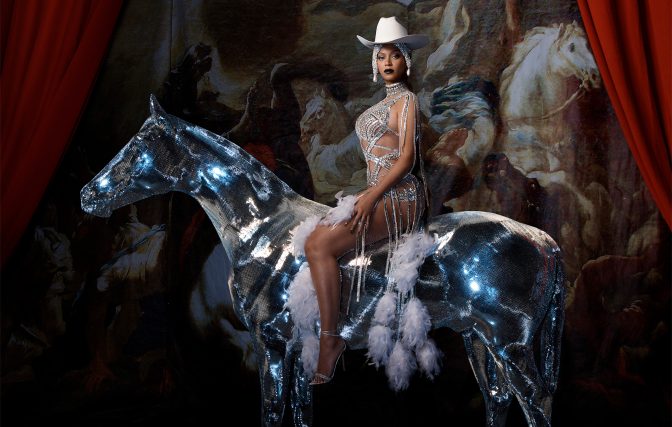Forget Twitter: what we really need is an edit button for our entire lives. Imagine the doomed relationships we could never have started. The war criminals we could have avoided voting for. The celebrity ‘novels’ we could have left on the shelf. The scabies-riddled booking.com death traps and one-for-the-road Jägerbomb blackouts we could have swerved. If only, with just a few clicks, we could backwards-engineer ourselves a lighter, happier, Bastille-free life.
At least now art is amendable. The days when an artwork was finished the second it was hung on a wall, a novel was writ in stone when fresh from the presses and a song was complete when etched into vinyl are dead. And they died, like so many passé conceits, at the mighty hands of Beyoncé.
When Bey quietly altered the online version of her new album ‘Renaissance’ last week to remove an ableist phrase and an interpolation of ‘Milkshake’ that the song’s singer Kelis objected to, she wasn’t the first artist to retrospectively change their music. In 2004, Black Eyed Peas retitled a distastefully named album track as ‘Let’s Get It Started’ for its Grammy-winning single release, just one step on from the common practice of scrambling, reversing or re-recording over expletives for ‘clean’ single versions of songs.
Numerous artists have re-recorded albums believing that, with the benefits of age and new technology, they can make them better: Mike Oldfield, Jeff Lynne, Car Seat Headrest, John Cale, Tangerine Dream. Paul McCartney famously reverted ‘Let It Be’ to his original ‘…Naked’ vision in 2003, minus Phil Spector’s strings and over-production. And Kanye West has made so many online alterations and additions to ‘Donda’ and ‘Donda 2’ that it seems like he considers Spotify his own personal ‘Work In Progress’ folder.
But Beyoncé’s swift and decisive edits have undeniably ushered in a new era of artistic revisionism. We are now entering the Age Of The Update, when high-profile albums will be reworked in their early weeks online depending on initial audience reaction. Historians may argue over the wisdom of erasing awkward or distasteful elements of culture as it goes, and the black holes it could leave in its evolution, but the fact remains that, thanks to Queen Bey, it is now fully mainstream and acceptable to return to the digital versions of your records and nip, tuck and tinker with them as you wish.
There are some pretty cut-and-dried justifications for making moral amendments to digital releases. Streaming services are even more public and universally accessible than any radio station so, if you’re censorious of nature, you can easily argue that they should be held to the same standards of acceptable output. But with streaming platforms now approximately 76 per cent ‘Will-this-do?’ album filler, all getting algorithmically pumped into the ears of innocent, unsuspecting music fans, why shouldn’t this extend to artistic revisions too?
While the CD and vinyl versions will forever act as a sonic historical record, the possibilities for improving digital music are now endless. McCartney could not only wipe ‘Why Don’t We Do It In The Road?’ and ‘Revolution #9’ clean off ‘The White Album’ – he could replace ‘Yellow Submarine’ with ‘Paperback Writer’ on ‘Revolver’ and finally settle the best-albums-ever pub argument forever. Imagine ‘Be Here Now’ with a couple of minutes of cocaine indulgence shaved off each song. Or all those Babyshambles albums without the five or six tunes that everyone in the studio was too twatted to play.
If we grasp it, it’s an emancipating moment. Radiohead could simply erase ‘Fitter, Happier’ from digital history. Month-long records like U2’s ‘Rattle And Hum’, Guns N’ Roses’ ‘Chinese Democracy’, ‘Donda’ and everything by The Smashing Pumpkins since 1995 could suddenly shine online as the faultless EPs they were always meant to be. For the sake of retrospective musical perfectionism, I’d happily accept a brass-free ‘Country House’.
Effectively, Beyoncé has given the entire music world administrator rights over their own legacies. Musical history has officially been declared fluid and, in this brave yet brutal new world, entire annoying elements of otherwise brilliant records could be swept away overnight. With just a bit of tweaking, for example, Sam Smith’s albums could be exposed as moving, powerful, entirely instrumental records.
All those bagpipe solos, improvised poetry codas and 20-minute kazoo freak-outs that seemed such a good idea in your ‘refreshed’ state? It’s now perfectly OK to go back with a wiser, more sober mindset and remix them off the most public record. The door is now open to leave all of the musical mis-steps, indulgences and screw ups of the past 60 years or so to the vinyl heads and show future streaming generations, under constant sonic bombardment by the algorithm, music’s best possible face. Get pruning, popsters…
The post Now Beyoncé’s pruned ‘Renaissance’ post-release, here are the albums I’d like to be updated too appeared first on NME.
